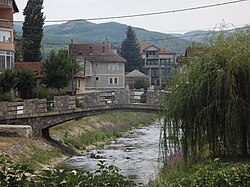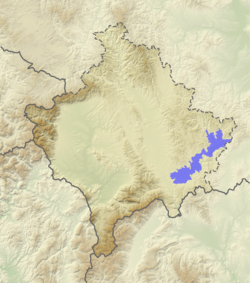Kosovo Pomoravlje (Serbian: Косовско Поморавље / Kosovsko Pomoravlje, "Pomoravlje of Kosovo"), or Anamorava (Albanian: Anamoravë), is a valley in Kosovo, in the southern part of the District of Gjilan surrounding the Binačka Morava River. It stretches eastward to the Preševo Valley in southern Serbia. The mountains in this region, rising to an altitude of 1,000–1,200 metres (3,300–3,900 ft), border the Skopska Crna Gora region in north of Skopje.[1] Gjilan, Kamenica, Novo Brdo and Viti are municipalities located in the region. The region gave its name to Kosovo-Pomoravlje District, which largely corresponds to its successor District of Gjilan in Kosovo.
Kosovo Pomoravlje
Binač Pomoravlje | |
|---|---|
Valley | |
 The Binač Morava flows through Viti | |
 Kosovo Pomoravlje within Kosovo | |
| Country | Kosovo |
| Area | |
• Total | 650 km2 (250 sq mi) |
Name
editThe region is known as Kosovsko Pomoravlje (Косовско Поморавље, "Morava Valley of Kosovo") in Serbian and as Lugina e Anamoravës ("Valley of the side of Binač Morava") in Albanian.[citation needed] Its name is derived from the Binačka Morava river, which flows through northern North Macedonia, eastern Kosovo and southern Serbia as part of the Great Morava river system.
Geography
editKosovo-Pomoravlje District was a district of Serbia until 1999. After the United Nations Interim Administration Mission in Kosovo took control in 1999, it was transformed into the District of Gjilan. Anamorava is about 50 kilometres (31 mi) long and 15 kilometres (9.3 mi) wide. It is bordered by the Skopska Crna Gora mountains in the south and the Goljak in the north, and borders Kosovo field in the west. On the east, it borders the Morava Valley. The region's largest city is Gjilan.
The region can be divided into Lower Kosovo Pomoravlje and Upper Kosovo Pomoravlje, which is also part of the Skopska Crna Gora region.[2]
The region includes part of the valley and the Skopska Crna Gora region and Koznik mountains. Gjilan has six municipalities and 287 smaller settlements.[3] The spa in Klokot has several thermal springs valued for their medicinal qualities.[4]
Climate
editAt an altitude of 210 metres (690 ft) above sea level, the region has a Mediterranean sub-continental (Koppen classification: humid subtropical) climate with light winds (usually from the southeast). Rainfall is light, and winter often brings rain and wet snow from the north; southern and southwestern winds tend to bring warm, dry weather. The region's average annual temperature is 12.2 °C (54.0 °F). January's average is 1.2 °C (34.2 °F), and July's is 22.6 °C (72.7 °F).[5][better source needed]
Hydrography
editTributaries of the Morava river system include the Karadak and Lapušnica rivers. The Preševo Valley is a corridor between the Morava and Vardar valleys, and the Morava valley's wetlands are home to many species of birds.[citation needed]
References
edit- ^ Robert Elsie (15 November 2010). Historical Dictionary of Kosovo. Scarecrow Press. pp. 29–. ISBN 978-0-8108-7483-1.
- ^ "Nexhat Cocaj". Google Docs. Retrieved 2022-09-27.
- ^ Академик Божидар Видоески, Говорот на Скопска Црногорија: МЈ, 1954, V, 1, стр.1-30; 2, стр. 109-196: 2 к
- ^ "Komunat në rajonin e Gjilanit". Archived from the original on 2018-08-28. Retrieved 2015-04-17.
- ^ Riza Çavolli: Geography Regional in Kosovo:,publisher ETMMK, Pristina, 1997.
Bibliography
edit- Urošević, Atanasije (1935). "Горња Морава и Изморник". СЕ3 51, Насеља и порекло становништва 28. Belgrade.
- Urošević, Atanasije (1931). "Гњилане". Гласник Географског друштва, св. XVII. Belgrade.
- Urošević, Atanasije (1935). Gornja Morava i izmornik. Mlada Srbnja.